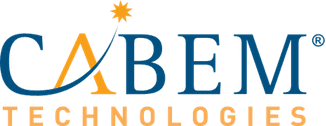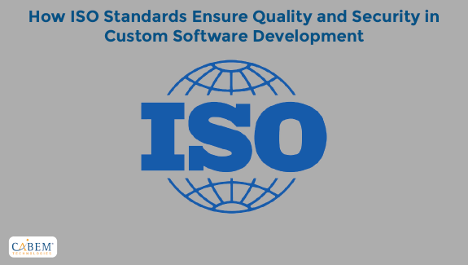In the dynamic world of software development, keeping up with quality and security best practices is crucial. Since more and more businesses are using custom software development services according to their business objectives, the importance of complying with sustained industry standards is a must.
The framework of ISO (The International Organization for Standardization) standards guarantees the most secure and highest-quality software development allowed by universal practices.
This article will explore the importance of ISO 9001 and ISO 27001 in custom software development, as well as how working with an ISO-certified company like CABEM Technologies can mean all the difference.
- 76% of organizations that implemented ISO 9001 saw considerable improvements in internal processes and efficiency (British Assessment Bureau).
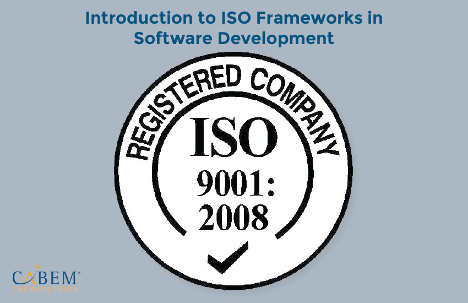
Introduction to ISO Frameworks in Software Development
ISO is a framework for a series of standards, designed to control multiple aspects of the operations performed by an organization, and can be used for software development.
These guidelines are more than theoretical—they also offer practical frameworks for maintaining a software product’s consistency, reliability, and security.
- Consistency Across Processes: ISO standards guarantee development consistency, leaving little to no room for errors and inconsistencies.
- Global Recognition: The ISO standards provide a credible mark of quality worldwide, instilling confidence in customers and stakeholders.
- Regulatory Compliance: It is also safer to use ISO frameworks to tackle legal compliance issues in highly regulated industries, including those keen on data protection.
- Improved Risk Management: Advantages of ISO standards include realizing risks in the project development timeline.
Enhanced Client Trust: Customers believe companies that comply with ISO standards to be more reliable and trustworthy.
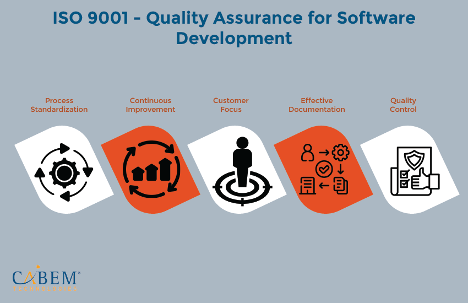
ISO 9001 – Quality Assurance for Software Development
A quality management system (QMS) can be described as a set of procedures, processes, and responsibilities that enable an organization to ensure the trustworthiness of its services.
It is an internationally recognized standard designed to ensure that organizations meet the client and regulatory requirements within products and services, and assist with customer satisfaction.
Key Elements of ISO 9001 in Software Development
- Process Standardization: The ISO 9001 standard requires procedures to be standardized. This ensures consistency and quality in different projects.
➢ Using ISO 9001 has helped companies with certification reduce project completion rates by 50%.
- Continuous Improvement: The standard stresses continuous maintenance, which means that software products are updated according to new requirements and technical means.
- Customer Focus: ISO 9001 aims to improve customer satisfaction, enabling the creation of software that addresses the level of end-users’ problems.
- Effective Documentation: ISO 9001 places great importance on process and procedure documentation, which promotes effective accountability and transparency.
- Quality Control: This standard has built-in regular audits and reviews, which are part of ISO 9001, and helps detect and correct the desired degree of quality.
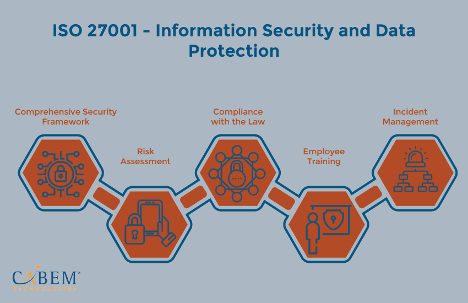
ISO 27001 – Information Security and Data Protection
Information security is the most critical issue, especially for organizations that handle sensitive information that needs to be kept out of bad hands. ISO 27001 establishes requirements for an information security management system (ISMS).
Why ISO 27001 is Important to Software Engineering
- Comprehensive Security Framework: ISO 27001 deals with different dimensions of information security, including encryption or access control, to ensure that sensitive data remains secure.
- According to a PWC study, companies certified with ISO 27001 have seen as much as 40% fewer data breaches.
- Risk Assessment: A comprehensive risk assessment of security risks and establishing controls to address these concerns.
- Compliance with the Law: Compliance with the requirements of laws and regulations to protect data (for example, GDPR).
- Employee Training: ISO 27001 recognizes the necessity of information security training for employees to become part of the organizational culture.
- Incident Management: The standard also describes dealing with security threats to avoid damage.
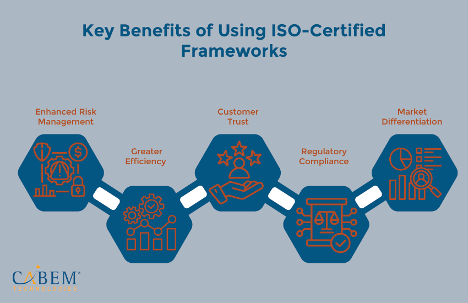
Key Benefits of Using ISO-Certified Frameworks
By implementing ISO-certified frameworks, software companies can improve the quality of their products, as well as add to client trust and satisfaction.
How ISO Certification Adds Value
- Enhanced Risk Management: Companies with ISO certificates have better risk management, which allows them to produce secure software products that guarantee stability.
- According to a McKinsey report, organizations certified with ISO are exposed to fewer project risks because they use advanced approaches to managing and reducing risks.
- Greater Efficiency: Implementing the processes under the ISO frameworks reduces development cycle time and costs, making operations more efficient.
- Customer Trust: The provision of ISO certification results in having a quality stamp, which ensures customers that the software will fulfill their requirements and is secure.
- Regulatory Compliance: Compliance with ISO standards promotes adherence to any policies related to that particular software, thus protecting it from legal problems.
- Market Differentiation: Being ISO certified gives a company a competitive edge over competitors.
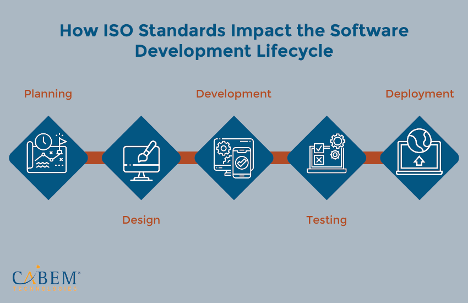
How ISO Standards Impact the Software Development Lifecycle
ISO standard impacts all stages of the Software Development Lifecycle (SDLC). In the planning stage of a project, ISO standards direct the early preparation stages to include risk identification, requirements gathering, and expectations with stakeholders.
ISO’s Role Across the SDLC Phases
- Planning: risk management and evaluation are crucial factors in stimulating planning processes in ISO standards.
- Design: In the design phase, the ISO frameworks are integrated by considering that security and quality assurance are built into the software’s architectural components.
- Development: During the development phase, ISO strategies include defining coding standards, design evaluation, testing and validation, and quality assurance.
- According to the Software Engineering Institute, organizations that follow ISO standards at the development phase have a 15% higher productivity.
- Testing: The ISO frameworks support appropriate testing techniques to locate and repair bugs within the application.
- Deployment: ISO ensures a smooth and secure deployment with proper documentation and training to the end users.
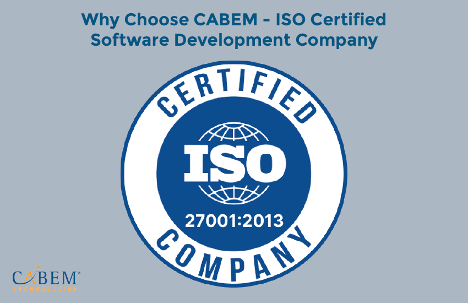
Why Choose CABEM – ISO Certified Software Development Company
CABEM Technologies illustrates how successfully following the set ISO standards can enhance the software development processes.
CABEM, with over 21 years of business experience and a 100% project completion rate, systematically uses all its ISO certifications to ensure consistency in the design of its secure and reliable software solutions.

What Makes CABEM Stand Out?
Robust Security Measures: Being an ISO 27001 certified organization, CABEM believes in the security and protection of the information of client data.
Custom Solutions: By leveraging CABEM’s proprietary Livia platform, we have a library of building blocks that save you time and ensure quality throughout.
Comprehensive Support: From the consultation and planning phase to deployment and post-delivery care, CABEM offers full-fledged support that secures a vibrant software development cycle.
Continuous Improvement: ISO 9001 drives CABEM towards constant improvement by staying ahead of the curve and continually improving its software products to grow alongside clients’ needs and industry trends.
FAQs
Why are ISO standards important in software development?
ISO standards set out a structured methodology for software development from start to finish, ensuring consistency, quality, and security. By complying with these standards, organizations can ensure that they deliver products that meet customer expectations and are more secure from security threats.
Are there other ISO standards relevant to custom software development?
Certainly, several other ISO standards might apply depending on the project’s specific needs. ISO/IEC 12207 describes software life-cycle processes, and ISO/IEC 25010 describes software quality requirements and evaluation.
How do ISO standards improve trust and credibility?
ISO accreditation is a mark of quality, in addition to security, that is acknowledged throughout the world. When any company gets ISO certification, it observes and practices the proper procedures and makes continual improvements, which increases the clients’ and stakeholders’ trust.
Can ISO standards be applied to existing software products, or are they only for new projects?
These standards may be applied to all new and existing software products. The standards can strengthen security by improving processes and ensuring continuous compliance with industry regulatory requirements when applied to existing products.
Why ISO-Certified Software Development is Your Key to Success
ISO certificates are an indispensable component of custom software development, ensuring the required quality and software security.
These standards dictate good practice for each stage of a product’s life cycle, including basic organizational detail, design, and subsequently deployment.
As is the case with CABEM Technologies, the company asserts the effectiveness of ISO standards in developing software solutions that are consistently effective, secure, and user-friendly and tailored to the client’s specifications.
When an ISO-certified partner is selected, the company’s risks in managing software development projects are reduced. Tasks with adequate quality transform into complete client satisfaction and outstanding results.
